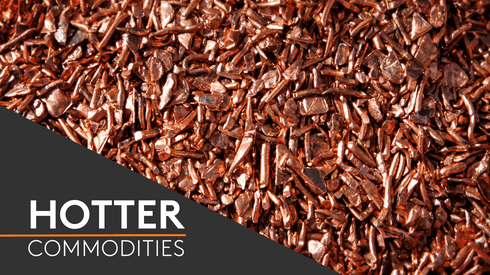This comes after an overall weaker session on Friday, with the London Metal Exchange Index (LMEX) closing down 0.4%, chiefly driven by an unwinding of reflation-oriented trades following the escalating rhetoric US and North Korea leaders and the release of disappointing inflation data in the USA.
Precious metals prices are mixed, with gold (-0.2%) and platinum (-0.2%) down but silver (+0.4%) and palladium (+0.1%) up. This reflects a slight decline in risk aversion after US and Chinese presidents spoke on the phone over the weekend to resolve the North Korean crisis. This follows a mixed trading session on Friday because safe-haven buying on geopolitical tensions was counterbalanced by weakened inflation expectations after the US consumer price index (CPI) miss.
On the Shanghai Futures Exchange (SHFE) this morning, the base metals complex is slightly down, with an average loss of 0.6%. Nickel (-1.5%) performs the worst, while copper (+0.3%) is the only base metal in positive territory. Spot copper prices in Changjiang are up 0.3% at 49,970-50,120 yuan per tonne and the LME/Shanghai copper arb ratio stands at 7.84.
Equities are off to a good start to the week, with Hong Kong Hang Seng Index (+1.17%), the CSI 300 index (+0.88%), and the KOSPI index (+0.57%) all up after a sell-off in European equities on Friday (due to risk aversion and a stronger euro) but a small recovery in US stocks (reflecting lower US Federal Reserve tightening expectations).
The dollar index is edging 0.14% higher to 93.20 after slipping 0.36% to 93.07 on Friday, driven by an unwinding of carry trades (reflecting the drop in investor affinity for risk) and a lower expected path of Federal funds rates (with the probability of one rate increase by year-end falling to 34% after the US CPI miss from 40%).
Let us now turn to economic data released earlier this morning in Asia. In Japan, gross domestic product (GDP) rose at a stronger pace than expected at 1.0% in the second quarter, marking its highest print over two years. In China, a raft of activity data (retail sales, industrial production, and fixed asset investment) for July noticeably missed market expectations. Yet, global risk sentiment has not deteriorated because the perceived tail risk of a military conflict in the Korean peninsula seems to have eased somewhat over the weekend.
Looking at the day ahead, the economic calendar will be very light, with investors likely to focus their attention to industrial production for June in the Eurozone.
Base metals are likely to trade slightly higher once disappointing Chinese data is digested by the market. Although the geopolitical climate remains tense, base metals are likely to continue to benefit from a positive sentiment. As such, we expect momentum-based buyers to remain the driver of the market in the days ahead.
Precious metals may continue to enjoy upward pressure because investors are likely to gradually lift their risk-unfriendly positions in their portfolios in light of the recent geopolitical developments. We prefer gold and platinum to silver and palladium because the former group has stronger haven characteristics (viewed as more “precious” by the market) than the latter.
Metal Bulletin publishes live futures reports throughout the day, covering major metals exchanges news and prices.




